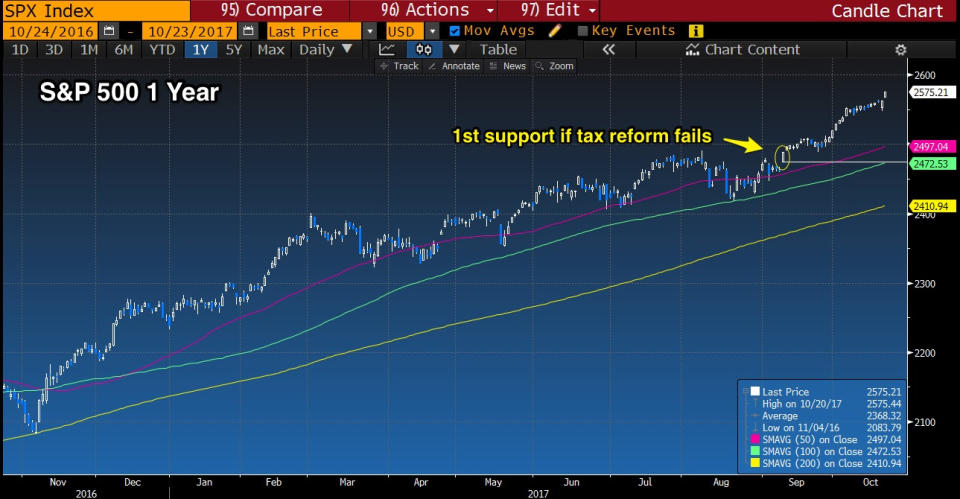Share buybacks are for greedy CEOs with no ideas: portfolio mgr
How far will the market fall without tax reform?
It’s not theory anymore. U.S. markets are clearly pricing in some level of tax reform. The tenor of the markets changed in early September when tax reform made its way back into the news cycle. Financials (XLF), along with tech (XLK) and materials (XLB) have led the way during the latest surge. Friday ended the week with another set of all-time highs. So all of this begs the question: Exactly what will happen if we don’t get a deal?

It’s not an unreasonable question. Year to date, the GOP has a legislative goose egg on the score board and desperately needs a win before 2018 and the unofficial start of the election cycle. If it doesn’t pass, then clearly there will be some kind of give back. Just how much is a guess. The 2475 level in the S&P 500 was the breakout in early September and a natural first stop in any retreat.
The second question: If tax reform becomes a reality and repatriation starts to bring back some portion of the $2 trillion in corporate cash offshore, just what will they do with it? In the past the favorite pastimes were of course stock buybacks and other financial engineering games. My hope is that we are at a point in the CAPEX (capital expenditures) cycle where CEO’s feel pressured to put some of it back into the economy. Increasingly, shareholders are demanding revenue growth, and buybacks (no matter how big) aren’t going to get you there. Remember, all buybacks do is reduce the number of shares outstanding, which artificially gooses the earnings per share (unfortunately at the expense of CAPEX and research).
Jeff Immelt — Former GE CEO

CEOs love to use the phrase, “We’re returning the cash to the shareholders.” What a bunch of BS. They’re really saying, “I have no ideas anymore, but I really want my bonus and I’m willing to mortgage the future of the company to get it.” What could be easier than announcing another mindless buyback strategy to easily make the quarterly earnings target? “I’ll leave the growth of the company and the mess I’ve made to my successors.”
Ralph Nader, long-term consumer advocate, nails it when he calls the buybacks unimaginative, even incompetent. There is no shortage of examples but the latest casualty, General Electric (GE), finally came clean last week and we got to see just how bad a job former CEO Jeff Immelt had done during his 16 years. Buybacks were certainly part of the game plan, and what did they get for it? Along with a buy-high sell-low strategy, trading divisions like baseball cards, Immelt used any number of financial gimmicks to keep the ship afloat.
Proponents of share buybacks will always hold up Apple (AAPL) as a shining example of just how star spangled good they are. Apple by any measure is the exception to the rule having accumulated so much cash. No level of responsible investment could have made a dent in the pile.
Back in Washington
Let’s bring the focus back to Washington and the budget deal where this post started. In the end, the both the House and the Senate have to agree on the same document, and currently the Senate version points to a $1.5 trillion deficit ten years out. The House could agree to go along with the bill, but clearly there are still issues to work out. The budget deal is an imperative for any hope on tax reform, as the GOP needs reconciliation to push legislation through with a simple majority.
As for the market, Goldman’s (GS) David Kostin probably puts it best in a recent note saying, “Tax reform will determine the direction of the S&P 500’s next 100 points.”
————————————————-
Please contact your Belpointe investment advisor representative if there are any changes in your financial situation or investment objectives.
Investment advice is offered through Belpointe Asset Management, LLC. Past performance is no guarantee of future returns. Insurance products are offered through Belpointe Insurance, LLC and Belpointe Specialty Insurance, LLC. It is important to read our email disclosures available at this link: http://belpointe.com/disclosures.

 Yahoo Finance
Yahoo Finance 